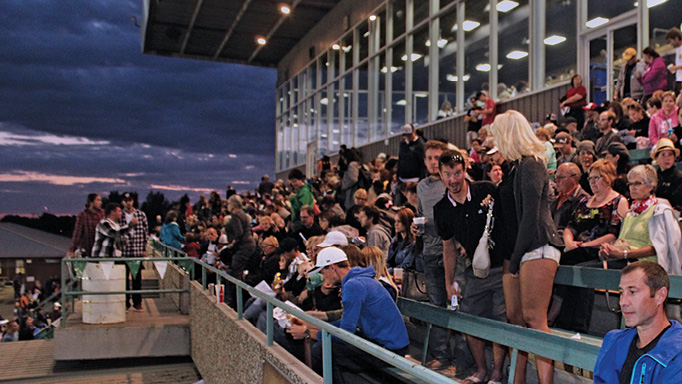Horse racing is booming in Saskatchewan. Attendance is higher than it has been in decades and handles are growing rapidly. In the first of a two-part series, this article introduces the details of racing in Saskatchewan. It outlines statistics from 2014, as well as introducing the major players in the sport that have shaped Saskatchewan’s racing industry. Part two will discuss their impact on the sport in the province.
Details (2014):
- Race days – 24
- Number of races run – 193
- Average races per night – 8
- Total purse pool – $784,800
- Average purse per race – $4,087.50
- Race with the highest purse – $20,000
- Number of horses registered – 392
- Pari-mutuel handle – $1,108,860 (Marquis Downs’ signal is not broadcast – this amount represents live and online wagering only)
- Average handle per race night – $46,202.50
- Average number of fans in attendance – 1,700
- Number of people licensed by the SLGA to work in the racing industry – 541
Marquis Downs officially opened on July 14, 1969. The track is a five-eighths mile oval with two chutes. The width of the track is 90 feet and the homestretch length is 660 feet. The grandstand has a seating capacity of approximately 3,200 and a stabling capacity of 650. A record attendance of 4,294 was attained on Aug. 13, 1971 and on Aug. 14, 1982, a wagering record of $261,169 was set.
The Players:
- Canadian Thoroughbred Horse Society (CTHS) – The Saskatchewan chapter is composed of a board of directors that work within the parameters of this national organization to support and encourage the breeding industry in the province.
- Horsemen’s Benevolent and Protective Association (HBPA) – The Saskatchewan chapter is managed by a board of directors and is responsible for implementing the mandate of the international organization in the province. This includes but is not limited to: disseminating vital information on critical issues to horsemen, promoting the exchange of ideas and information, providing a voice for horsemen on matters of policy and interest, assisting individual affiliates with particular problems and promoting the preservation and enhancement of live racing in the province.
- Saskatoon Prairieland Park Corporation (Prairieland) – Prairieland is a membership-based, not-for-profit organization, established in 1886. It is settled on 136-acres within the city limits and minutes from downtown. Prairieland has 200,000 square feet of meeting, trade show and conference space which has been upgraded in recent years with over $16 million in infrastructure enhancements. Prairieland has three full-time staff responsible for racing and wagering: the manager of racing (Rick Fior), a mutuel/administration coordinator (Rose Hnatiuk), and an operations manager, (Denis Paules). Other departments within Prairieland Park are not dedicated to racing but assist in the operations of Marquis Downs in the areas of human resources, marketing, finance, events, food & beverage and operations.
- Saskatchewan Liquor and Gaming Authority (SLGA) – The SLGA is a Treasury Board Crown Corporation that owns and manages all video lottery terminals (VLTs) in the province. SLGA licenses and regulates most forms of gaming including: bingo, raffles, casinos, break open tickets and horse racing. In Saskatchewan, SLGA is mandated with providing regulatory support to the horse racing industry to ensure the integrity of the races and the safety of participants. The Rules of Racing in Saskatchewan are set by the SLGA. SLGA updates, amends and reviews the rules in consultation with the racetrack and horsemen’s association. According to Doug King, the SLGA director responsible for Saskatchewan’s horse racing industry, the regulatory support is provided through the licensing of participants, officiating of races, regulatory veterinarian services and drug testing programs. At one time, the Saskatchewan Horse Racing Commission was an independent body. In 1995, it was amalgamated into the SLGA. The SLGA is composed of six staff members: four stewards, one Director, and one administrative support person. The SLGA’s annual budget related to the regulation of racing is approximately $300,000.
- Canadian Pari-Mutuel Agency (CPMA) – Is responsible for providing officers to supervise wagering at licensed racetracks and betting theatres, to ensure that pari-mutuel betting is being conducted consistently with the regulations made by the federal Minister of Agriculture and Agri-Food Canada.
Part two of this series will look at the challenges facing the horse racing industry in Saskatchewan. The province faces a number of issues that have the potential to stall or reverse the positive growth that has been seen in recent years. A frank discussion of these issues will hopefully serve to open dialogue on the organization and management of the industry.


